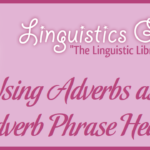Traditional grammars define verbs as “words that denote actions and states of being.” A verb phrase consists of a verb plus any auxiliary verbs, particles, modifiers, complements, and objects.
In grammar, a predicate is a word or phrase that expresses the action performed by the grammatical subject or the state of the grammatical subject. Only verbs and verb phrases can function as predicates. Examples of verbs and verbs phrases as predicates include the following:
- I am. (verb)
- She has left. (verb phrase)
- The man is dancing. (verb phrase)
- You seem sad. (verb + subject complement)
- My daughter loves Elmo. (verb phrase + direct object)
- Her husband listens to blue grass. (verb phrase + verb phrase complement)
- The librarian can look the information up. (verb phrase + direct object + particle)
- Our physician gave me some pamphlets for you. (verb + indirect object + direct object)
Verb as Predicate
Verb Phrases as Predicates
References
Brinton, Laurel J. & Donna M. Brinton. 2010. The linguistic structure of Modern English, 2nd edn. Amsterdam: John Benjamins Publishing Company.
Hopper, Paul J. 1999. A short course in grammar. New York: W. W. Norton & Company.
Huddleston, Rodney. 1984. Introduction to the grammar of English. Cambridge: Cambridge University Press.







